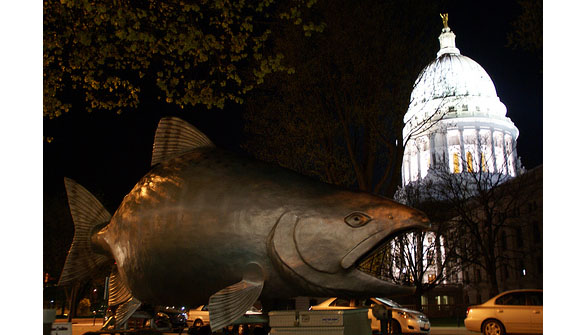forum
library
tutorial
contact

Two Experts Make the Case
for Acting Now to Bolster Salmon
by Bill Monroe
The Oregonian, May 18, 2008
|
the film forum library tutorial contact |

|
Two Experts Make the Case
by Bill Monroe
|
 Global warming is a lot easier sell this week than last.
Global warming is a lot easier sell this week than last.
Or, say, any time this past spring.
Snow, cold, rain . . . all of it is water under the bridge as record temperatures flush some of that near-record snowpack out to sea in one giant sauna.
"This winter wouldn't have been unusual at all 20 years ago," said Jim Martin of Mulino, retired state fisheries chief for the Oregon Department of Fish and Wildlife.
Martin is also a popular keynote speaker at national and international environmental and resource conferences, and he's an author of Oregon's coastal coho plan.
"As global warming progresses, there are going to be these anomalies from year to year," Martin said. "But a cursory examination of the scientific record shows in the long run we're in a world of hurt."
Are enough of us aware?
Martin is co-author with Patty Glick, the Seattle-based senior global warming scientist for the National Wildlife Federation, of "A Great Wave Rising," a comprehensive review of the science linking warming to the future perils for salmon.
The report was published as U.S. District Judge James Redden completes his review of the federal government's latest answer to his do-it-or-else command to fix the region's growing salmon problems. He has turned down three prior plans.
The newest plan, Glick said, seems the best yet at patching some holes in the road 10 years out. But although the proposal acknowledges climate change, Glick and Martin believe immediate planning is necessary to stave off problems facing salmon by 2100.
"It's just window dressing," Glick said. "They essentially say that because they only have to deal with developing a strategy for the next 10 years that climate change doesn't matter. Holy cow! Isn't that like putting a Band-Aid on a severed artery and calling it good until the Band-Aid falls off again?" A wake-up call
The Sacramento River's salmon problems, which have stalemated Oregon's summer salmon fishing, are a wake-up call, she said. The withdrawal of water from the Sacramento's rich salmon-rearing delta wouldn't have been nearly as catastrophic, for example, if the system's upper reaches were healthier.
Martin and Glick's report can be found on the Web at lightintheriver.org. Light in the River is a project of 54 fishing, environmental and energy conservation groups responsible for three successful lawsuits to block what Martin said were the government's "illegal and insufficient salmon recovery plans."
"A Great Wave Rising" is a comprehensive look at the past, at global warming's current and pending impact and, especially, a blueprint to help save salmon as temperatures warm their native waters.
Innovations include such things as pumping cold groundwater into some streams to cool them through the summer; expanding tributary shading; providing capture-and-lift mechanisms for dams to move adult salmon into pristine upriver habitat and, of course, removing the lower four dams on the Snake River that block upstream and downstream passage.
"We're doing a lot to help salmon survive the decade, but nothing to help them survive the century. We've written off the headwaters," Martin said. "The North Santiam River is a classic example. We have the technology to get those fish into some very good habitat in the Cascades. We don't need to take out any dams on the Willamette system. We're going to need them to counter the effects of warming." Dams cut off habitat
The Snake River dams, on the other hand, prevent salmon from using the Columbia Basin's richest salmon-producing habitat in Idaho. Half of the 13 endangered salmon runs won't make it without removing the dams, Martin said.
Three lower-river treaty tribes accepted a recent $980 million package of salmon and steelhead projects and will no longer call for removing the Snake River dams. Only Idaho's Nez Perce, the system's fourth major treaty tribe, resisted the buyout.
To take out the dams, Martin said, would have cost $20 million more.
"These are public funds," he said. "There should be a congressional investigation."
And much more scrutiny from the media. Martin said he's disappointed by the lack of coverage in Seattle and Portland media outlets.
"We can have six days straight of front-page headlines on the fate of six sea lions that don't matter a bit in the long run, while the inadequacy of the single most significant action relating to salmon . . . gets no discussion of real adequacy at all."
learn more on topics covered in the film
see the video
read the script
learn the songs
discussion forum
